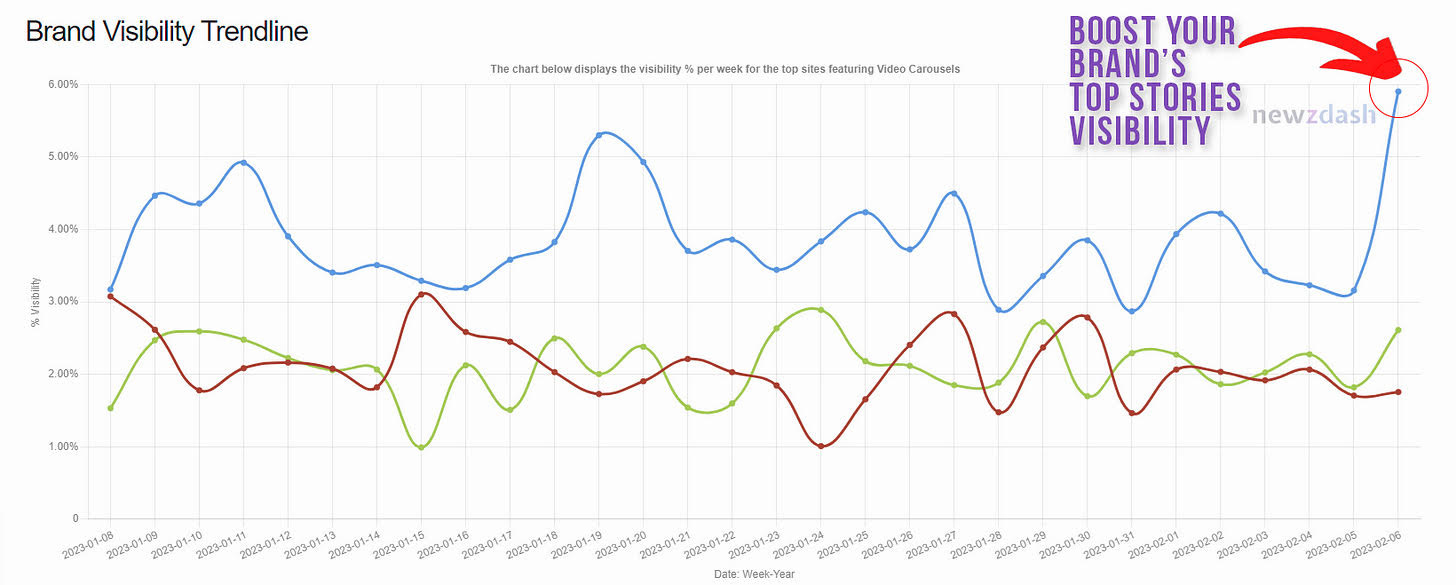Mastering E.E.A.T: How to create content Google wants
We cover Google's updated guidelines on Experience, Expertise, Authoritativeness, and Trustworthiness. Discover how mastering these pillars can elevate your content's visibility in search
#SPONSORED
Breaking News: GDdash Wins Best SEO Innovation at European Search Awards 2023!
🏆 Exciting Update! Introducing GSC Simplified: automated keyword clustering, evergreen content drop detection, and Algorithm Update Traffic Analysis. Unlock Discover Competitive analysis & author topical authority. Simplify your GSC data and gain actionable insights instantly. Don't miss out!
Hello, and welcome back. Jessie here, fresh off a wonderful, packed week at the Online News Association conference in historic Philly! The ONAs are such a wonderful journalism conference, and getting to meet some of our subscribers and sponsors in person — and hand out WTF is SEO? totes and stickers — was a real treat. A wonderful bonus: A dozen community members met for dinner to discuss all things news SEO! Here's to many more in-person meetups (where I'll let someone else pick the hopefully not-25-minutes-away restaurant).
This week: Now that Google expanded the concept of E.A.T to include experience, we’re updating our guide. E.E.A.T, or experience, expertise, authoritativeness and trustworthiness, is a set of factors Google considers when evaluating if a publisher is providing helpful, relevant information.
Join our community of 1,385 news SEOs on Slack to chat any time.
Let’s get it.
In this issue:
What are the pillars of E.E.A.T?
Explaining experience, expertise, authority and trustworthiness.
How to create content with strong E.E.A.T.
THE 101
What is E.E.A.T?
E.E.A.T is part of the guidelines used by Google’s human raters to evaluate if search is providing helpful, relevant content in results. It stands for Experience, Expertise, Authoritativeness and Trustworthiness.
It is not a direct ranking factor. However, Google does want to serve results with strong E.E.A.T. So understanding the four pillars of E.E.A.T — then producing content with strong signals of expertise, experience, trust and authority – is very helpful for news publishers.
Google says its guidelines are also useful for creators “seeking to understand how to self-assess their own content to be successful in Google Search.”
Some history: Google introduced E.A.T to its guidelines in 2014, and added the extra E for Experience in 2022. In a press release, the company said the addition was made to “better assess our results.”
The new E evaluates if content is created by someone with subject-matter experience.
As Lily Ray explained, even before adding the second E, Google started doubling down on the importance of experience with their product review updates. The search engine indicated that first-hand involvement with a product was important for E.A.T over several updates.
“Double-E-A-T” — an alternative name for the signals — is meant to “better capture the nuances of how people look for information and the diversity of quality information that exists in the world.”
Google's iterations to the system and how it ranks content is a sure sign the search giant cares a lot about the concept of E.E.A.T.
E.E.A.T is a sibling concept of topic authority: By producing stories that demonstrate experience, expertise, authoritativeness and trustworthiness — and linking those stories together — a publication can build authority in that subject area and Google will surface that site’s content more.
Your Money or Your Life is a cousin of E.E.A.T: Your Money or Your Life (YMYL) is a Google-coined term for topics concerning a person’s “future happiness, health, financial stability or safety.” For these topics — such as how to pick blood pressure medication or applying for a mortgage — E.E.A.T is extra important. Bad information could result in real, harmful consequences.
How you understand and demonstrate E.E.A.T will vary depending on your coverage area(s).
Showing experience for food coverage will be vastly different than straight news. For example, for a travel writer, “experience” might include the number of countries visited, while for court reporters, it’s the number of years on a beat.
Trust for product reviews may be presented through a "Why trust us" section, which includes rules for accepting free products, whereas an investing columnist's author page would include financial disclosures.
Start with your core coverage areas and think critically about how to show each E.E.A.T pillar.
Why does E.E.A.T matter for SEO?
E.E.A.T is a human-centered, audience-first concept.
As indicated above, E.E.A.T is important for queries where surfacing truthful information really matters (YMYL topics) because failing to do so could have real-life negative consequences.
This makes sense: We want publications that provide quality information to show up in search above a Tummy Tea influencer or some other non-expert source. It's essential these SERPs serve trustworthy information, not misinformation on queries that affect people’s lives. (This also means you should make sure YMYL content stays accurate over time by doing regular updates.)
For readers seeking information on sensitive topics — saving for retirement or starting to exercise after childbirth — it’s a big deal if Google sends readers to sites with incorrect information.
It matters less if you’re looking for, say, penguins learning to climb a rock.
Google says that pages “with no attempt to help users” are the lowest quality pages. These spammy, low-quality URLs don’t fulfill search intent. Instead, they’re trying to beat the system and drive revenue, but don’t provide any value. Don’t do that. Focus on the reader, not the algorithm.
This is journalism 101. If the content you produce does not have strong E.E.A.T signals, why are you producing it?
THE HOW TO
Each of the E.A.A.T pillars
Experience
What is it: Experience refers to the content creator’s first-hand experience with the topic areas. Experience was added to E.A.T. acronym around the time ChatGPT/generative AI entered the chat; it’s likely Google added the second E to underline the importance of human-created content.
What to think about: What is the author’s personal experience with the topic they’re writing about? If they’re a travel blogger or restaurant reviewer, have they tried the hotels or dinner spots they’re suggesting? Further, how are they communicating the first-hand experience?
As Lily Ray explained, it’s useful to include language like, “When I did my testing…” or “I experienced this with the product…”
For travel or food bloggers, that could be, “When I checked into the hotel …,” or “My first course was …”
Language that reflects first-hand experience signals that exude trust for Google and readers alike.
AI cannot experience the real world, so think about how to make your content more visibly human. How do you make it clear you’re a person out in the world, basing your ideas on tactile experiences?
Expertise
What is it: Expertise refers to the author’s expertise and depth of knowledge on the topic.
What to think about: Who wrote this content and are they extremely knowledgeable in their field? Is the author a go-to source, and do they have credentials to back it up? As a publisher, how are you communicating this expertise to Google?
Review authorship across your site: Articles need clear (potentially enhanced) bylines; author pages should be robust with complete schema.
At the story level, communicate how a story was produced. Think of it as a methodology sidebar: Your newsroom — the editors, reporters and fact checkers — knows how a story came together. But readers don’t. Explain in a bylined secondary piece of content (video, text or on a podcast) the project, including who was involved, how long it took and the rigor of the reporting. Here’s an example from The Globe and Mail’s Tom Cardoso: How we did it: How we uncovered systemic bias in prisoners’ risk assessments
How does Google know: Expertise is evaluated at the article level. This is particularly important for YMYL topics. Consider including photos or videos of the author immersed in the topic (testing a product or experiencing a place). Placelines that indicate a journalist reported from a specific location can be a useful trust signal, too.
Authoritativeness
What it is: Authoritativeness measures the overall reputation of a publication.
What to think about: What is the reputation of the publication? How well-known and integrated into society are the reporters? Is it a well-known publication in the industry — and by the audience — or just getting started?
How does Google know: Signals of authority include the number of backlinks from reputable sites, reach on social platforms and branded search volume for your publication.
Google analyzes the whole publication, along with its reporters, to determine a site's authoritativeness. Google is asking, "Is this outlet an authority in news and business reporting? Are other sites or social media outlets talking about this reporting?"
Trustworthiness
What it is: The overall trustworthiness of the site and whether what they are producing is factually correct and honest.
What to think about: Who is responsible for this content, and are they legit? This includes the content author, the content and the overall website. For news articles: Is it factually accurate and supported by expert consensus?
Authorship can be a trust-building exercise.
Trust is earned. It’s one thing to publish an accurate, compelling story and believe the readers will trust you because you’re a prominent journalist. But telling readers how and why you came to know something, in plain terms, can be hugely important in gaining trust — specifically on sensitive or complex stories.
For example, on big investigations, create a sidebar that explains key takeaways (and link back to the original content), the reporting process and how you arrived at core findings. Doing so in language is a reader service: It demonstrates why your reporting can be trusted.
How does Google know: Google looks at who else has linked to the site and if they are trustworthy. Google also looks at the health of your site; in the guidelines, they use the example of a shopping page checkout page with an insecure connection as an example of a site being untrustworthy.
🔥Lily Ray on influencer marketing and SEO: The ability to mix social virality with SEO strategy will be hugely important top-of-funnel visibility. [📹Video]
Writing E.E.A.T content
Expert content is created by understanding a user’s search intent, doing keyword research to find their questions, then providing answers with helpful, relevant information from expert sources.
When writing, think about:
Purpose: What’s the purpose of this piece/page? What is the search intent for this story? Use keyword research to identify the questions readers have, then answer them with expert reporting. Aim to create 10x content, topic pages, then build out pillar pages, and ensure everything is linked together. That’s how you show authority.
Expertise: If it’s about money, health or other high-stakes topics: Experts, experts, experts. Consult a diverse set of expert voices to add value and answer reader questions.
Pro tip: There’s a strong signal between journalist’s social media channels and how their content shows up in search. Have your writers promote every story they write on their social media.
The bottom line: E.E.A.T content is well-researched, accurate content, written by expert authors with experience in their subject matter. Encourage reporters to write with clarity and precision, but avoid excessive jargon that might be lost on readers. Enhance authorship and provide clear signals of trust. Consider who your audience is, and write for them.
RECOMMENDED READING
💻 Google: The search giant announced an August 2023 core update. It’s the second core update of the year. Rollout of the update has started and is expected to take two weeks to complete.
The company also updated its documentation regarding file types indexable by Google to include CSVs.
Google Showcase data is now available (in Showcase and Google Search Console).
🗞️ Press Gazette: Is it a surprise that The New York Times topped the list of 50 biggest news websites in the US? Meanwhile, The Independent and CBS News were dubbed the fastest-growing publications.
📎 Search Engine Journal: How to improve Interaction To Next Paint (INP), the new Core Web Vitals metric.
🔍 Clara Soteras Acosta: What is Google Discover showing in your country? Help Clara Soteras Acosta research the answer.
🤖 Originality.ai: How many of the world’s largest websites have blocked ChatGPT?
❄️ Stephanie Briggs: Tips on SEO work for category pages (especially with the holiday season coming up).
#SPONSORED - The Classifieds
State of Digital Publishing: Double the organic traffic to your digital media and content property with SODP's Publisher SEO online course. Use code WTFISSEO for 20% off any plan!
Get your company in front of almost 7,500 writers, editors and digital marketers working in news and publishing. Sponsor the WTF is SEO? newsletter!
THE JOBS LIST
These are audience jobs in journalism. Want to include a position for promotion? Email us.
Newsday is hiring an Internet News Manager (Hybrid, NY).
The Lenfest Institute is hiring a Community Manager (Hybrid, PA).
Podglomerate is hiring a Manager, Marketing and Audience Development (Remote).
What did you think of this week's newsletter?
(Click to leave feedback.)
Catch up: Last week’s newsletter
Have something you’d like us to discuss? Send us a note on Twitter (Jessie or Shelby) or to our email: seoforjournalism@gmail.com.
Written by Jessie Willms and Shelby Blackley











